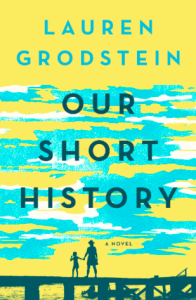 Our histories are defined by how much time we have, or so we’re led to believe. My history with my son? Eleven years. My history with my friends? Going on twenty-five or so for the closest–twenty-eight for the shoe-ins, my cousins. My history with my parents? Thirty. (Not counting what I’m sure were their terribly boring first four years of marriage all alone without children. How did they ever survive?!)
Our histories are defined by how much time we have, or so we’re led to believe. My history with my son? Eleven years. My history with my friends? Going on twenty-five or so for the closest–twenty-eight for the shoe-ins, my cousins. My history with my parents? Thirty. (Not counting what I’m sure were their terribly boring first four years of marriage all alone without children. How did they ever survive?!)
Our histories are as long as we are allowed to make them.
Karen Neulander’s history with her son, Jake? Six years. So very short, indeed. Diagnosed with late-stage ovarian cancer in her early forties, the campaign manager no one wants to tousle with is now facing the toughest of all opponents: impending death. Grodstein offers a glimpse into Karen’s fictive experience of an all-too-real ordeal in her novel, which is set to be Karen’s book to her grown-up, future Jake; throughout the book itself, Karen details her current cancer updates, advice for her son, and family stories which she’ll not be around to tell.
For more on Our Short History, set to be published by Algonquin Books in March of 2017, continue.
I have not read a book that has so aptly encapsulated my feelings as a single parent; not only that, but also a single parent with family that doesn’t always see things the same way I do. Often emotions can go from disappointed to angry and irrational to humble in less than five minutes, sometimes during even one phone call.
Of course, I’m not dying. Not like Karen.
The three parts of the book Our Short History make up a left behind manifesto for her son Jake. Part one is in Seattle where Karen is preparing for the rest of her life. She is thrown off when Jake wants to meet her father, Dave, a man that turned cold upon hearing he’d be a father.
Part two continues in Manhattan as her illness and procedures continue, Dave seeks more time with Jake, Karen’s paranoia at having her son taken from her enhances both her need for control over her life and her realization that she has none–she is dying. As her health worsens, so does her ability to rationalize her role. She wants control over her son because she feels as if she’s always had to be in control. Dave initially told her he never wanted kids and she left, the break up trailing behind like a hole in her back. Dave assumed she’d gotten an abortion; Karen assumed Dave would want nothing to do with her or their child. And so life went on for six years until Jake asked if he could meet his father.
Assumptions. Killers, amiright?
Throughout all of this personal front plot, there is also a sub plot detailing Karen’s career. She works for a Clinton-esque councilman who cannot quit scheming on his wife. It is interesting how his narrative interplays with the lessons Karen learns, even though they’re different journeys.
And so the story goes. The narrative showcases exactly how one’s mental state would be reeling–not only from the buzzer alarm of cancer, but also from a relationship one never planned on ricocheting, the sting and simultaneous stab of former love.
The overall theme is that time is relative. We all think we know that, but when it’s time what will we leave behind for our loved ones? Money? A famed career? A novel? While some parts of the narrative seem naive for a character with Karen’s background (two solid decades in political campaign management–cut throat business), it is also proof of just how drastically one’s life can be altered by terminal illness, turned into a reflection of the life one used to lead. I recommend this book to anyone with a penchant for reflection, unsettled memories of terminal illness, or a reason to feel thankful. Also, you know, it’s a pretty good story.





